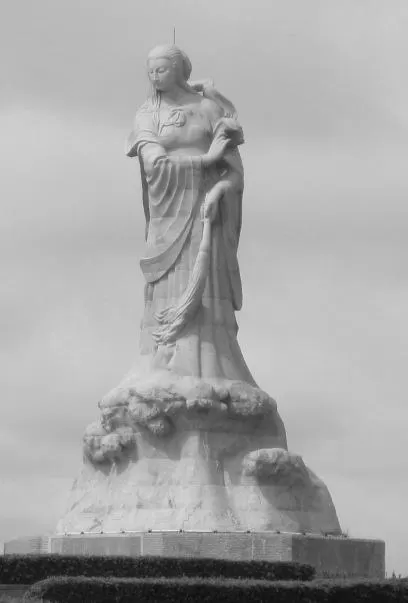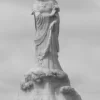The Chinese ocean deity Mazu is the patron goddess of sailors. Before becoming a goddess, She was a human, which is why She is responsible for the safety of all those who spend their lives on the seas. She can also warn you of impending storms. As a result, she is considered a mighty deity.
Mazu is a Chinese ocean deity.
Mazu, the Chinese ocean deity, is a central figure in traditional Chinese religion. She is revered in temples around the world and private homes. Mazu worship involves rituals, such as offering flowers, incense, and firecrackers. Residents may also march in evening processions carrying lanterns and requesting the goddess’ blessings. Worshiping Mazu is a way to express social identity and promote a sense of community.
Mazuism was first practiced in Fujian Province and eventually spread to other parts of China. In the 19th century, the belief spread to other regions, including the United States and Japan. Chinese immigrants to these areas often built temples dedicated to Mazu. In Macau, Mazu is known as A-Ma and is believed to be the origin of the name “Macau.” Australia’s most prominent Chinese temple is also dedicated to Mazu, and new temples have been saved in the United States and Japan.
Mazu’s cult began in ancient China and spread to other regions through miraculous intervention. Mazu’s close association with seafarers and fishermen helped her cult spread. Moreover, the fishing communities’ networks were often religious, further extending the cult.
Mazu is one of the most popular Chinese deities. The ocean goddess is responsible for the safety of people traveling on the water. She can be invoked to warn sailors of approaching storms and other hazards. She can also heal people. In addition, she can predict weather changes and announce when sailors should return home. As such, sailors and fishermen prayed to Mazu before embarking on their journeys and thanked her once they reached land.
Legends about Mazu date back to the Song Dynasty. She was born in Meizhou Island, during the Min Kingdom, as the sixth or seventh daughter of a wealthy fisherman. Legends say she was the reincarnation of Guanyin and helped poor people predict the weather.
She is the patron goddess of sailors.
The Chinese ocean deity, Guanyin, is also the patron goddess of sailors. She was initially known as Tara, a female counterpart of the bodhisattva Avalokitesvara. She was believed to have been born from the tears of Avalokitesvara. Both men and women worshiped her. She later made her way to China through the Silk Road trade during the Han Dynasty. She came to China in the form of a maiden named Miaoshan. Her father wanted her to marry a wealthy priest.
This sea goddess is also known as Tin Hau, Mazu, Tian Fei, and A-Ma. Her mission was to protect sailors and fishermen. She was initially worshiped by Chinese people and was even incorporated into the pantheon of the Taoist religion. She is revered as a compassionate protector, contrasting with the authoritarian father figures many Chinese people worship.
The stories of Mazu are familiar throughout China, particularly in coastal communities. Mazu is believed to protect sailors and fishermen from harm, and she has more temples than any other Chinese female deity. Her shrines are located worldwide, and her holiday falls on the 23rd day of the third lunar month.
Chinese ocean deities have been worshipped for centuries in China. The Goddess Ama was honored in Meizhou Bandao during the Song* dynasty, and by the early Ming dynasty, she had already become the Chief Goddess protecting maritime navigation. All seafarers on the Chinese coast prayed to her to protect their vessels. Ama was also worshipped in the Lingnan region, where Macao is located.
She is a human before becoming a goddess.
The Chinese ocean deity, Guanyin, was once a human before becoming a goddess. She was born in 960 to a low-income family of fishermen. She was mute and had a strong swimming ability. She is considered to be one of the Eight Immortals.
The Chinese ocean deity, Mazu, is worshipped in coastal regions of the country and East and Southeast Asia. The legend states that she was once a mortal girl who learned the Taoist arts and saved her father and brother from typhoons. She later became a goddess and was regarded as the patron saint of fishermen in her area and later spread her worship throughout the country.
She is often depicted surrounded by children. In the famous Journey to the West, she is seen as the protector of travelers. Her statue is adorned with many arms and eyes, and her robes have multiple colors. Her headdress is usually covered with jewels, which are a symbol of her goddess status. In addition to being a human, she is accompanied by two guardian demons.
The story of Guan Yin’s incarnation in Chinese mythology is quite interesting. It explains the origin of the world and how life was created. It also describes the basis of the sun, moon, and stars. It helps explain some of the natural phenomena in China.
According to Chinese mythology, Guan Yin, also known as the Queen Mother of the West, was once a human before becoming a goddess. Her powers include immortality and longevity. She is the wife of the Jade Emperor and holds the Mandate of Heaven. She also approves the rule of human emperors in China.
She was outlawed as “superstition.”
The Chinese ocean deity Mazu was once considered a rank superstition by the Communist Party. However, the Chinese ocean deity has made a remarkable comeback in the last few years. It is now a successful moneymaker in China. Communist leaders are even using the Creator to achieve political ends.
The ocean deity is often worshipped as a patron saint of fishermen. Legend says that the god will calm the sea for fishermen, particularly when rocks threaten their boats. According to some accounts, Guanyin once sat on Mount Putuo, where she meditated.
Chinese sailors prayed to the ocean deity every day. This deity kept a record of every boat that sailed the seas. Changing the name of a vessel was considered to try to get past Poseidon. This daring act could result in a gloomy fate. Albatrosses are also believed to store the souls of sailors.







